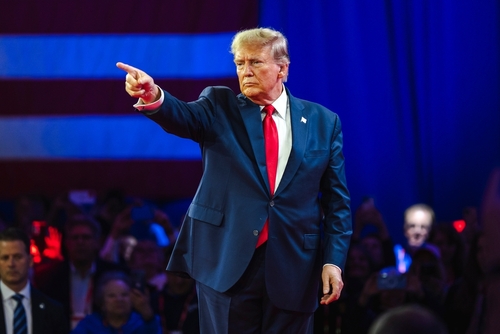During a tense exchange at an economic forum in Chicago, Donald Trump took the opportunity to school Bloomberg Editor-in-Chief John Micklethwait on tariffs. The former president, confident in his economic philosophy, defended his protectionist policies, which have been a hallmark of his tenure and 2024 campaign. Micklethwait challenged Trump on whether these tariffs harmed the economy, but Trump retorted with his characteristic bravado, “You’ve been wrong all your life!” He dismissed critiques from mainstream economists and media, arguing that his tariffs boosted the U.S. economy by protecting American industries.
Trump’s tariffs, which target goods from countries like China, are designed to prevent what he calls "unfair trade practices" and ensure manufacturing jobs stay in the U.S. His recent proposals include expanding tariffs by 10-20% on all foreign goods. The policy, he asserts, is a cornerstone of his economic agenda and central to his "America First" platform, which aims to revitalize the nation’s industrial base. Critics, however, argue that these tariffs could raise prices for consumers and hurt working families. Some estimates suggest that the average household could face additional costs as high as $4,000 per year due to increased import prices.
Trump is a legend.
He sits down with Bloomberg hack, tells him to his face that he is fake news, and the crowd of business people are all cheering him on in agreement.
This is exactly why the MSM didn’t want Trump to have crowds at the debates.
— Clandestine (@WarClandestine) October 15, 2024
Micklethwait’s concerns echoed many in the economic establishment, who argue that tariffs could backfire by stifling global trade and driving inflation, particularly in an interconnected global economy.
Economists and industry leaders have voiced skepticism over Trump’s claims that tariffs benefit the U.S. economy long-term, with some projecting negative impacts on GDP and consumer spending. Trump countered by pointing to the successes of his trade war with China during his first term, claiming it led to better trade deals and stronger economic performance.
I am just going to say this.
After watching Trump's interview with Bloomberg at the Chicago Economic Club, which Kamala declined to do I might add, Trump is a MASTERCLASS.
He got a STANDING OVATION when it was over.
We are going to win this!! pic.twitter.com/QJkvw2TVTw
— AmericanPapaBear (@AmericaPapaBear) October 15, 2024
This latest clash exemplifies the broader debate over tariffs as Trump campaigns for his 2024 presidential bid. As Trump presents himself as the champion of blue-collar workers and U.S. industries, mainstream economists continue to warn that these protectionist policies will have unintended consequences on American consumers.
Micklethwait, representing the broader media consensus, pressed Trump on whether the tariffs would lead to economic isolation and job losses, but the former president doubled down, insisting that any short-term pain was worth the long-term gain for America’s economy.
While Trump’s supporters rally behind his tough stance on trade, critics are quick to point out that tariffs often lead to higher prices on consumer goods, from electronics to automobiles. Estimates from economic think tanks, such as the American Action Forum, suggest that Trump’s proposed tariffs could result in a 20% increase in the cost of some imported goods, further inflating prices for consumers. The debate around tariffs continues to polarize experts and voters alike, with Trump maintaining that his policies are about leveling the playing field for American workers.
As Trump builds momentum in his campaign, his unapologetic defense of tariffs is likely to remain a contentious issue. While tariffs may have yielded some short-term victories in renegotiating trade deals, the long-term economic impact remains uncertain, with critics warning that consumers and industries reliant on imports will ultimately bear the cost. Nonetheless, Trump’s insistence on tariffs as a tool of economic leverage is central to his vision of a prosperous and self-reliant America.

